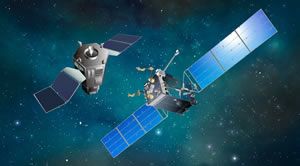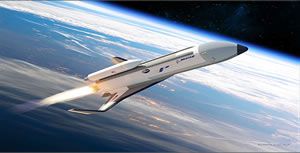DARPA laying groundwork for growth in-space robotics
Sandra Erwin for Space News: DARPA pioneered the concept of using robots for in-space repairs and more recently invested millions of dollars in a public-private partnership with Space Systems Loral to build an autonomous vehicle for servicing satellites 36,000 kilometers above Earth.
Please and Thank You: How DARPA Is Teaching Robots Manners
Kacey Deamer for Live Science: Researchers created a machine-learning algorithm that allowed robots to "intuit" how to behave like humans in certain situations, like being quiet in a library.
DARPA taps Boeing for unmanned reusable spaceplane
Ross Wilkers for Washington Technology: Boeing has emerged as the winner of a DARPAcompetition to design and test an unmanned reusable spaceplane.
Designing Agile Human-Machine Teams
DARPA seeks mathematical methods to enable a general-purpose design tool for optimizing human-machine teams in a diverse range of national security contexts
SSL to provide robotic arms to DARPA for satellite servicing
DARPA Goes "Meta" with Machine Learning for Machine Learning
Data-Driven Discovery of Models (D3M) seeks to increase pace of scientific discovery and improve military planning, logistics and intelligence outcomes
CODE Takes Next Steps toward More Sophisticated, Resilient, and Collaborative Unmanned Air Systems
Eight companies participating in Phase 2 research that aims to leverage promising open software architectures and intuitive user interfaces
DARPA Demo Day 2016 Aims to Speed Transition of Game-Changing Technologies to Military Services
Pentagon event showcases more than 60 DARPA research programs-and the teamwork with the science & technology communities that make those programs possible
DARPA Exhibit to Open at Chicago's Museum of Science and Industry
"DARPA: Redefining Possible" to showcase past technological breakthroughs, current projects and future possibilities
Novel miniaturized circulator opens way to doubling wireless capacity
Researchers develop a microelectronic substitute for larger-scale magnetic components and open a pathway to more efficient communications and more capable radar systems
NRL Engineers to Lead Payload Development for Robotic Servicing of Geosynchronous Satellites
The Front-end Robotics Enabling Near-term Demonstration, or FREND, flight prototype robotic arm performs fully autonomous grapple testing. This testing demonstrates RSGS on-board processing's ability to track and guide a robotic arm to grapple a launch vehicle adapter ring (left) that is common to many spacecraft designs.
Gremlins Takes Flight to Provide Air-Recoverable Unmanned Air Systems
Four teams initiate research into affordable, distributed technologies that could provide breakthrough tactical and strategic capabilities
Program Aims to Facilitate Robotic Servicing of Geosynchronous Satellites
Servicing vehicle jointly developed with a commercial partner would leverage DARPAs successes in space robotics and accelerate revolutionary capabilities for working with satellites currently beyond reach
Share Your Audacious Ideas to Improve Military Systems at the 2016 TTO Proposers Day
Two-day event encourages proposals for system-level technologies and prototypes that could redefine the state of the art for capabilities, development time and cost
Mining Everyday Technologies to Anticipate Possibilities
DARPAs "Improv" effort asks the innovation community to identify commercial products and processes that could yield unanticipated threats
Records 1 to 15 of 44
Featured Product

ResinDek® TRIGARD® ESD ULTRA FOR HIGH-TRAFFIC ROBOTIC APPLICATIONS
To maximize the productivity of an autonomous mobile robot (AMR) or automatic guided vehicle (AGV) deployment, it's critical to create the optimal environment that allows the vehicles to perform at their peak. For that reason, Cornerstone Specialty Wood Products, LLC® (www.resindek.com) created the TriGard® ESD Ultra finish for its ResinDek® engineered flooring panels. The TriGard ESD Ultra finish is ideal for high-traffic robotic applications characterized by highly repetitive movement patterns and defined travel paths.



